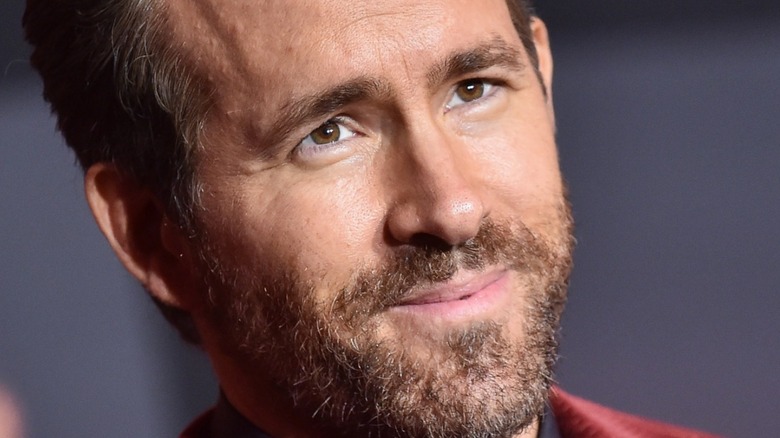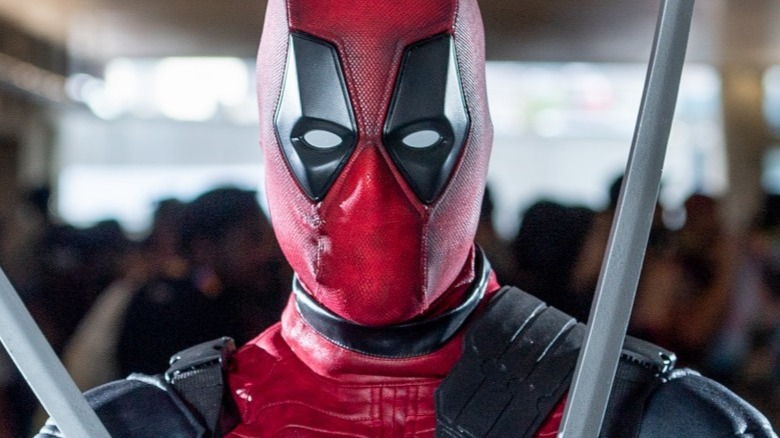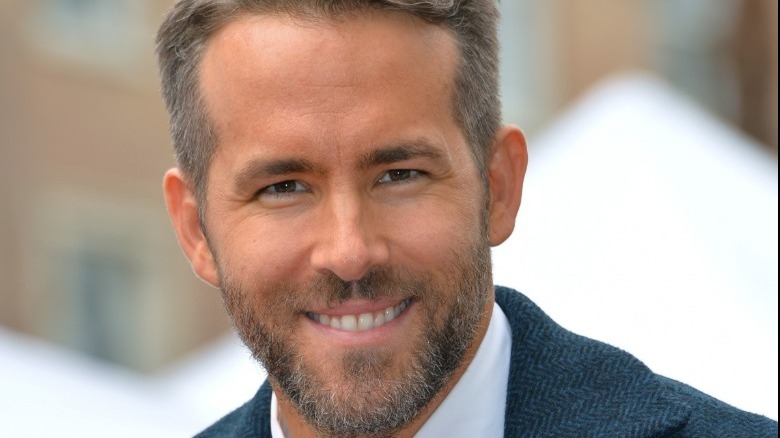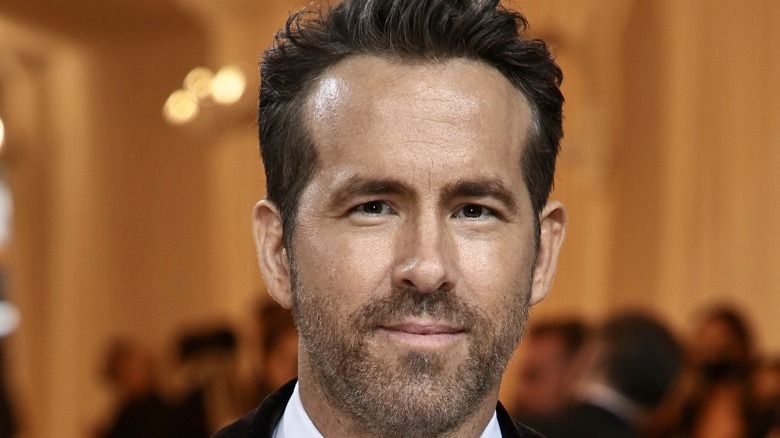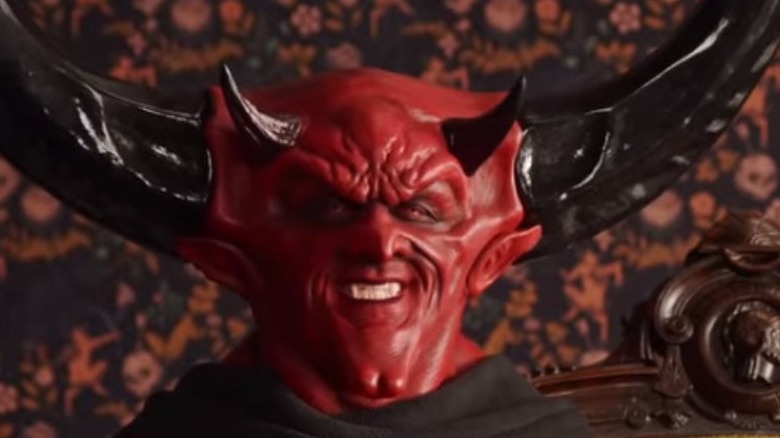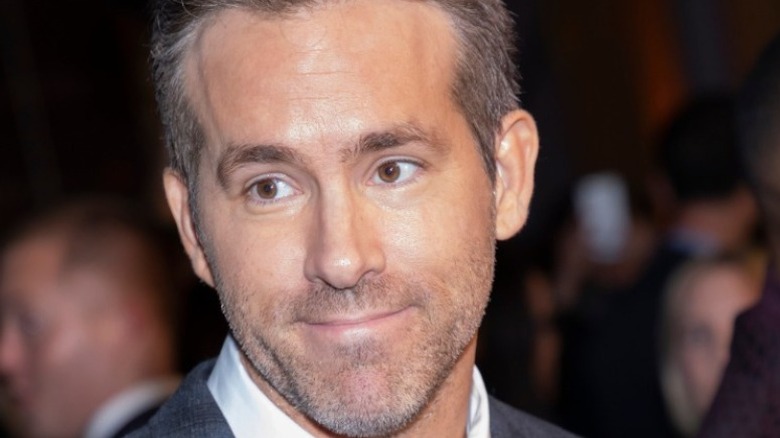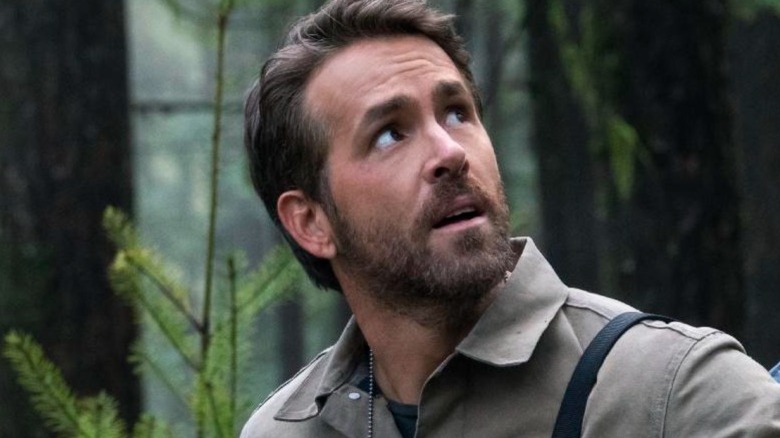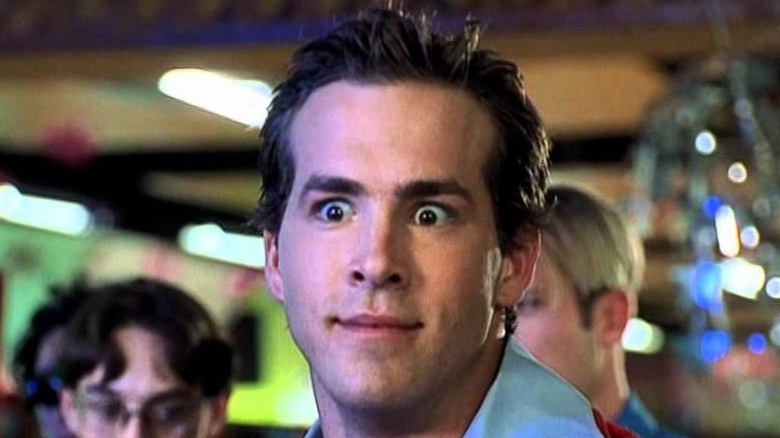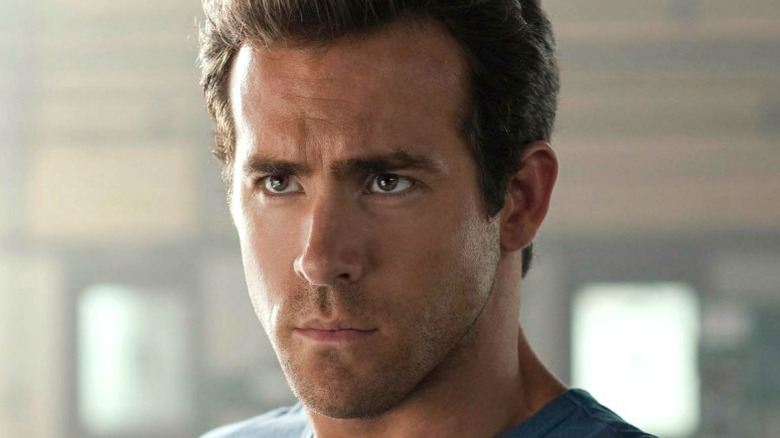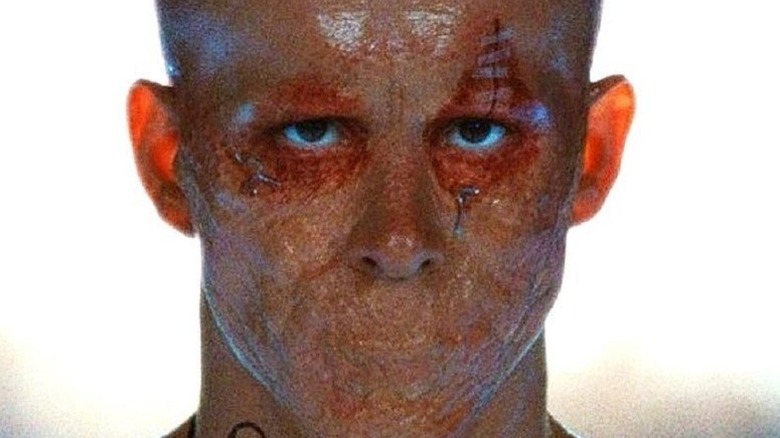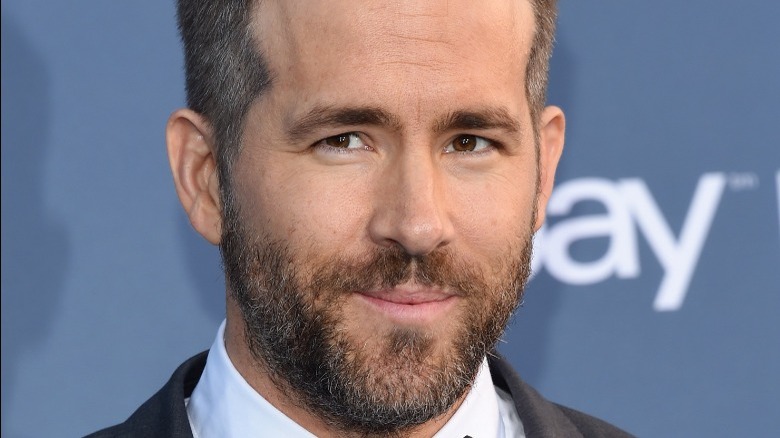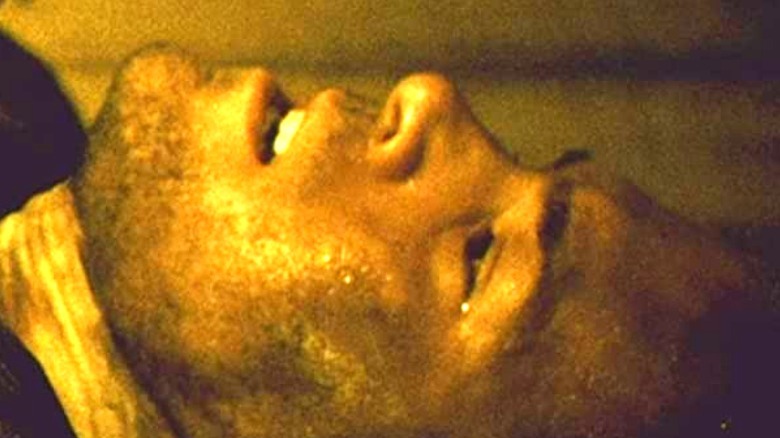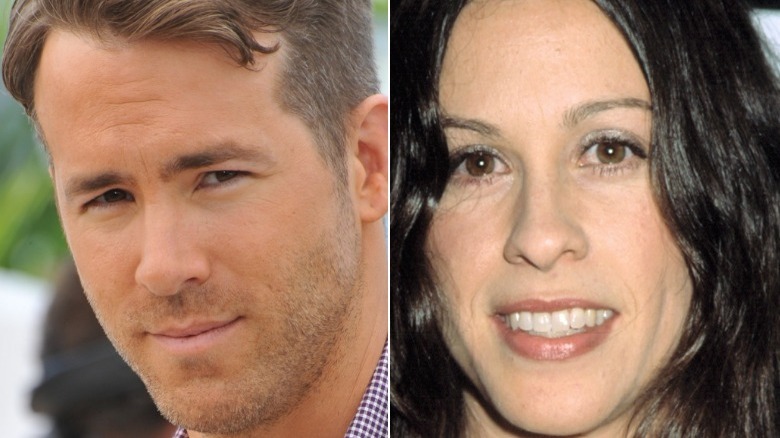Ryan Reynolds' 6 Best And 6 Worst Career Moments
Ryan Reynolds was born on October 23, 1976 in Vancouver, British Columbia. On his rise to become one of Canada's most well-known Hollywood imports, he experienced many highs and lows. The youngest of four brothers, Reynolds struggled to connect with his father's gruff veneer. After his father passed in 2020, Reynolds spoke candidly about their relationship and its impact on him. He told GQ, "I had a rough 10-year patch with my father ... But I actually had that sort of epic moment that only happens in films, where I saw him before he died and closed the loop as much as I could." Reynolds is also open about his life-long anxiety struggles, and how they impact his work.
So how did an anxious Canadian kid become a successful business magnate and an A-list actor with his own superhero franchise in "Deadpool"? For Reynolds, the road began at an open Nickelodeon casting call in 1991. Then just 13 years old, Reynolds landed the lead role of Billy Simpson in the Canadian teen soap "Hillside," which aired as "Fifteen" in the U.S. At 19, he moved to Hollywood and has worked steadily as an actor for over 30 years — with no signs of waning.
Ryan Reynolds' career has soared in the past three decades; some of his professional moves have been golden, and some have acted as minor missteps on his rise to the top. Let's take a look at some of the best and worst career moves of Ryan Reynolds.
The snarky merc with a mouth
One of the best steps Ryan Reynolds has taken career-wise was seeing "Deadpool" through its 11-year journey to fruition. The road to getting "Deadpool” made was an arduous one, but it proved worth it. Reynolds committed to playing the role after starring in "Blade: Trinity." At the time, Reynolds' "Trinity" director, David S. Goyer, was slated to write and direct a "Deadpool" feature for New Line Cinema, but the X-Men universe was the property of 20th Century Fox, and the "Deadpool” project eventually landed there (via IGN).
When "Deadpool" finally hit the silver screen, Reynolds perfectly inhabited the sarcastic superhero, Wade "Deadpool" Wilson. From a litany of pop culture references through the breaking of the fourth wall, Deadpool gave audiences a unique and fun Marvel hero. The film also solidified Reynolds' status as a bona fide movie star who could carry an action film. With its much-anticipated 2016 release, "Deadpool" became the highest-grossing R-rated film of all time, netting a cool $745 million at the worldwide box office. The film and its sequel held that record until 2019, when "Joker" took in $788.1 million. Reynolds even congratulated "Joker" star Joaquin Phoenix on his success. A third "Deadpool" film is in the works, and the wild success of the first two films firmly set Reynolds on the A-list.
Mint Mobile connections
Over the past few years, Ryan Reynolds has branched out from the world of entertainment with savvy business moves. While celebrities are often brought into the corporate fold for brand recognition, but don't do much in the way of actual strategy or company work, Reynolds goes all in on his ventures. As a majority shareholder in Mint Mobile since 2019 (per Fox Business, Reynolds owns between 20% and 25% of shares of the cell phone carrier), he has helped grow the company and sees his role in it as a pivotal one.
Reynolds spoke with TechCrunch about his Mint Mobile investment, stating, "We're (celebrities) generally hocking or getting behind or investing in luxury and aspirational items and projects ... What if we kind of got into something that was hyper-practical and just forget about the sexy aspirational stuff?" Reynolds' practicality and hands-on investment in Mint Mobile seems geared to pay off — not only is he the face of the company, heavily participating in their marketing campaigns, but per Brain Sharper, Mint Mobile has seen an explosive 50,000% growth in revenue since 2019.
Innovative, maximum marketing effort
In 2018, Ryan Reynolds decided to take his innate humor and knowledge of marketing and turn them into a flourishing side business. The second highest-paid actor in the world could have used his time between films to relax, but productivity seems an inherent trait in the man. Reynolds founded the marketing company Maximum Effort with his friend and business partner, George Dewey. The company grew quickly, producing viral ads for Reynolds' shareholding ventures, Mint Mobile, Match.com, and Aviation Gin.
The Maximum Effort website displays the actor's humor and Canadian roots with an "Aboot" pillar page, and although the page mentions Reynolds' name, it isn't adorned with photos of him, and the company's success isn't just about celebrity branding. Maximum Effort's TV ads stand out for their hilarity — specifically in a series of Aviation Gin ads featuring Reynolds' fictitious twin, Gordon. In 2021, performance TV platform MNTN purchased Maximum Effort; Reynolds will stay on as chief creative officer, and MNTN won't absorb the company. Per The Hollywood Reporter, MNTN CEO Mark Douglas said, "Maximum Effort's work speaks for itself and having spent a lot of time with Ryan, I know I've found a partner who likes to move fast and take big swings." Reynolds' love for marketing shows in Maximum Effort's, uh, efforts thus far.
He helmed the Match.com ads that united Americans
In a year full of chaos, Ryan Reynolds gifted the world with an ad that unified us in the craziness of the 2020 experience. The Match.com 2020 ads spoof "When Harry Met Sally..." and follow a crimson-red, horned Satan on his romance with a cute and perky girl named 2020.The two meet on a rainy day in Central Park; they proceed to steal toilet paper, work out at a gym closed for the pandemic, take a selfie in front of a dumpster fire, and snuggle as they watch an apocalyptic world burn. Set to the soundtrack of Taylor Swift's re-recorded "Love Story," the short ads allowed us to laugh at the "unprecedented" year we'd just experienced, and quickly went viral.
Reynolds joined the Match Group board in July 2020 — the group, which owns dating profile sites Tinder, OKCupid, and Hinge as well, welcomed Reynolds and his marketing ideas with open arms. Reynolds and Maximum Effort quickly got to work, creating ads for Match.com. The actor wrote and directed both the first ad, "A Match Made in Hell," and its sequel, and both resonated with viewers. To date, the initial "Match Made in Hell" ad has received over six million views on Reynolds' YouTube channel. Reynolds wrote the ads to incorporate zeitgeist nods and light looks at the terror the world experienced in 2020, and somehow it helped.
Sold Aviation Gin for a sweet payday
In another huge 2018 acquisition move, Ryan Reynolds became a co-owner of Oregon's Aviation Gin. The actor talked to Fortune about his decision to purchase Aviation, and his belief that there's a gin craze brewing with young craft cocktail lovers. Throughout the 21st century, celebrities have very publicly purchased (and sold) shares in liquor companies — from George Clooney's Casamigos Tequila to Diddy's Ciroc Vodka. Even Peyton Manning and Kendall Jenner jumped in the game (with Sweeten's Cove Bourbon and 818 Tequila, respectively). But none of the above examples have associated themselves as closely with their acquisitions as Reynolds.
The Portland, Oregon-based Aviation Gin, founded in 2006 by distiller Christian Krogstad and bartender Ryan Magarian, was purchased by Davos Brands in 2016. With Reynolds on board, Aviation Gin experienced new-found publicity — Maximum Effort took over marketing the liquor, producing a satire of a Peloton ad. Reynolds' witty humor soon became synonymous with the brand.
In 2020, the British spirit corporation Diageo purchased Aviation from Davos and Reynolds – for the small price of $610 million. Reynolds' ever-expanding stock portfolio grew exponentially as a result of this smart move. Aviation experienced success with Reynolds as the gin's celebrity spokesman, and his passionate marketing prowess had much to do with that achievement as well.
He starred in the family-friendly Adam Project
The early 2020s brought a spate of feature films from Ryan Reynolds, and most fit the mold of the rest of his lengthy resume. From 20th Century Studios' "Free Guy" to Netflix's "Red Notice" to Lionsgate's "Hitman's Wife's Bodyguard" — regardless of audience reception, all three action-comedies represent the roles for which Reynolds is best known. Then there's "The Adam Project." A sci-fi time travel film from Netflix, "The Adam Project" gave Reynolds a chance to shine for younger audiences. While it still earned a PG-13 rating, the film centered around the relationship between a grown Adam Reed (played by Reynolds) and his 12-year-old self (Walker Scobell). Reed is a fighter pilot from 2050 who attempts to return to 2022 to save his future wife, only to crash in 2018, where he meets himself as a little boy.
With both stellar and poor reviews from critics, "The Adam Project" landed well with audiences. The story is heartwarming and Reynolds' humor still plays a central role, while the young Scobell effortlessly riffs with him. But there are far more moving moments than sarcastic scenarios on display here. "The Adam Project" allowed Reynolds to reach a younger demographic not touched by many of his roles, thereby expanding the range of audiences who love him.
Now that we've covered some of Reynolds' career highlights, let's take a look at some of his missteps.
He was typecast by playing Van Wilder
At first glance, the 2002 comedy "National Lampoon's Van Wilder" seemed like a brilliant choice for Ryan Reynolds. The collegiate comedy landed Reynolds his first starring role on the big screen and there's still a faithful "Van Wilder" fanbase today. Reynolds' unique brand of sarcasm is on full display throughout the movie, and many "Van Wilder" lines are still quoted, over 20 years after the film's release.("Write that down.")
However, playing a partying man-child in a bro comedy as one's first starring role has its downside. In "Van Wilder," Reynolds' titular character is a seventh year senior and big man on campus at Coolidge College. Wilder makes it his mission to help younger students learn how to party and fully live life while he cowers in fear at the thought of his own graduation and assimilation into the real world. As a serious character actor, it may prove hard to find a way to showcase your acting chops in a crude comedy. Reynolds played the role with a lovable vulnerability, but the role didn't display a wide range of his acting talent and seemed to typecast the actor. Wilder proved grating at times and since he's always "on," it was difficult to separate Reynolds from his character.
Green Lantern was a bust
In 2011, when Ryan Reynolds signed on to play Hal "Green Lantern" Jordan, it looked as if the role would position him to transform into a blockbuster movie star. Riding high off the success of his 2009 leading role in "The Proposal," Reynolds was recognizable to audiences and likable. He even won People's 2010 Sexiest Man Alive – what could possibly go wrong? After all, films like the "X-Men" series and various "Batman" franchises had netted a killing at the box office. With Reynolds starring alongside Blake Lively – his future wife and a rising star in her own right — "Green Lantern" could have turned into its very own franchise. "The Avengers" had yet to hit the silver screen, and the timing of Green Lantern's foray into the cinematic world of superheroes seemed right.
Alas, "Green Lantern" bombed at the box office, and was panned by critics and audiences. Reynolds told EW, "With 'Green Lantern,' I don't think anyone ever figured out exactly what it was. That isn't to say the hundreds of men and women didn't work their fingers to the bone to make it as good as possible. It also fell victim to the process in Hollywood which is like poster first, release date second, script last." He went on to discuss signing on for the project before he'd read the script, which in hindsight, was probably a mistake.
Reynolds played a vastly different Deadpool
A couple of years before the failure of "Green Lantern," there was the head-scratching "X-Men Origins: Wolverine." Ryan Reynolds' first appearance as Wade "Deadpool" Wilson came in this 2009 offering. The role featured in the film bore no resemblance to the Deadpool antihero of Marvel Comics, nor did Reynolds' portrayal stand as a foundation for his successful future performance.
In the majority of the film, Deadpool can't speak — arguably one of the superhero's greatest powers. His mouth is, in fact, sewn shut. Deadpool also stands as a reluctant nemesis of Hugh Jackman's Wolverine, and none of the healing powers the two heroes share are on display in his character. Nothing about Deadpool's comic book origin story makes an appearance here. In the "X-Men" canon, "X-Men Origins: Wolverine" feels woefully out of place, if not downright nonsensical.
Reynolds took the "X-Men Origins: Wolverine" role as he was already attached to the yet-to-be-written "Deadpool" feature, but he felt wrong about the character's depiction from the beginning. Filming took place during the 2007 to 2008 WGA writers' strike, so any notes or revisions came from the actors and directors on set. However misguided the Deadpool role was, the actor's participation helped the hilarious faux feud between Reynolds and Hugh Jackman to blossom, and that alone makes the disastrous film worth it.
His personal brand growth eclipsed his acting roles
When Ryan Reynolds became the face of the marketing campaigns for Mint Mobile and Aviation Gin, he became synonymous with those brands. While these moves certainly grew his monetary worth, and may have helped lead those companies to elevated success, the 119 acting credits to his name (per IMDb) took a bit of a back seat.
Reynolds has graced our screens in hilarious commercial spots and continued to act in films including the animated "Pokémon Detective Pikachu" and "6 Underground." Nonetheless, from 2018 to 2020, Reynolds' marketing skills and personal brand often appeared on display and never seemed to vary. While his brand is evident in all of his successful films too, the more specific the brand becomes, the harder it is to depart from that. Each ad campaign also features Reynolds' signature witty banter; he's downright hilarious, but serious dramatic roles may elude him the more he becomes attached to — and thought of by — his brand.
Although the "Pikachu" film did extremely well at the global box office, Reynolds' live-action thriller, "6 Underground," was a Netflix release rather than a theatrical one. The Michael Bay-helmed film, co-written by "Deadpool" screenwriters Paul Wernick and Rhett Reese, received terrible reviews, even though it was tightly paced, featured loads of explosions, and was packed with Ryan Reynolds one-liners. It might be time for Reynolds to explore more nuanced roles that depart from his brand.
Different types of roles did not bring box office success
In fairness to Ryan Reynolds, he has made several attempts to branch out and further show off his acting prowess. For the most part though, these roles haven't been as well-received. With Reynolds playing to type so often, audiences may not feel ready to embrace a different side of the actor. Thus, Reynolds' few departures from his usual demeanor may have taken away from his box office draw. Some of these roles came before "The Proposal" proved audiences could buy him as a romantic lead, while others arrived before "Deadpool" solidified his superhero success.
Films like the 2010 thriller "Buried" and the 2007 mystery "The Nines" showed a more nuanced, serious character actor hiding in Reynolds' leading man body. In "Buried," Reynolds pulls off an entire film by himself — literally, as he's the only on-screen character. In "The Nines," Reynolds shares the screen with Octavia Spencer, Hope Davis, and Melissa McCarthy, who has also made a successful transition from pure comedy to dramatic acting parts. Reynolds show phenomenal range by portraying three different characters in the film.
Both films bombed at the box office, although "Buried" was critically acclaimed and certified "fresh" on Rotten Tomatoes. Even though Reynolds inhabited his off-brand roles well, his attempts to branch out did not reap financial rewards.
Breaking up with Alanis Morissette dinged his nice guy image
Ryan Reynolds is considered one of the nicest guys in Hollywood on and off the set. Through the years, he's mostly reaffirmed this image. However, before finding the love of his life in Blake Lively, Reynolds was briefly married to Scarlett Johansson, and prior to that was engaged for three years to Alanis Morissette. His rebounds after both came quickly, and the break-ups left gossip columnists everywhere speculating on what caused their demise.
In the case of Johansson, she's stated that her divorce from Reynolds is now water under the bridge, and she told Glamour that she may have "romanticized" the relationship, as she married Reynolds when she was just 23. But in the case of Morissette, she opened up to Access Hollywood about her devastation after her break-up from Reynolds. She even wrote the 2008 album, "Flavors of Entanglement," about her broken heart after Reynolds left. Morissette never publicly uttered a bad word about her ex — the two were together from 2002 to 2006 – but perhaps Reynolds could have handled the break-up a bit better.
For every successful actor, there are a series of wise moves and missteps that inform their career. In the case of Ryan Reynolds, his failures haven't been scandalous or disgraceful, and he seems to take them all in stride.
